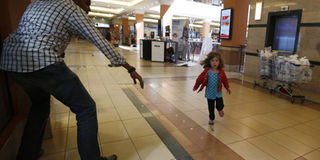Tales of the brave and the villains

Mr Abdul Haji, a licensed gun holder, beckons to a child fleeing from danger at the Westgate shopping mall on September 21, 2013.
What you need to know:
- Despite such stories of courage, the film also lays bare the fact that security forces failed to respond in good time. According to the narrator, 45 minutes after the attack started, police were yet to arrive at the mall.
- Those who honour the heroes of the nation would do well to give a honourable mention to Corporal Nura Ali, a plainclothe police officer and businessman Abdul Haji.
- Although they only had pistols and tear gas canisters, he and his colleagues made their way towards Nakumatt to confront the attackers who were armed with bigger guns and grenades.
When the story of what actually happened at Westgate Shopping Mall on the day terrorists attacked last September is told, special mention must be made of Ali Miraj, an Administration Police officer who was guarding one of the banks at the mall.
After the two attackers captured in the Terror at the Mall documentary had thrown a grenade on the ground floor, causing panic among patrons, they started shooting. In the ensuing stampede, many of the patrons ran into Nakumatt supermarket, which occupied two floors. The terrorists, walking leisurely, followed them there.
As they headed towards the entrance of the supermarket, Miraj spotted them and started firing rapidly.
SHOOTING RAPIDLY
“I was using my rounds to cover myself, shooting rapidly so that I could deny him a chance to shoot at me,” he told the narrator in the documentary.
“I shot him in the right leg or the knee there. He was limping, so I knew I had injured him.”
That was the first major setback that the terrorists suffered and in all probability, it slowed them down, in effect giving more people a chance to evade death.
Despite such stories of courage, the film also lays bare the fact that security forces failed to respond in good time. According to the narrator, 45 minutes after the attack started, police were yet to arrive at the mall. Ninety minutes later, they were yet to get into the mall. That delay cost one life too many, especially those who waited for death as blood oozed from their veins in slow life-sapping rivulets.
Those who honour the heroes of the nation would do well to give a honourable mention to Corporal Nura Ali, a plainclothe police officer and businessman Abdul Haji.
Although a civilian, Haji worked side by side with the plainclothes officers to rescue many who were wounded.
“We were very anxious to go in and try to save some lives,” Ali says in the HBO documentary released last week. “I was not thinking that I could die, that I could get shot.”
His courage, and that of his five other colleagues must be acknowledged for the lives they helped to save after they climbed to the roof of the mall and discovered tens of people who were in pain, dying without anyone to help them as the police dithered and kept armed civilians from entering the mall.
It was Ali who summoned the ambulances that were waiting in the street outside the mall. If only more officers had acted as courageously, it would have made all the difference.
Although they only had pistols and tear gas canisters, he and his colleagues made their way towards Nakumatt to confront the attackers who were armed with bigger guns and grenades.
SHOT IN ABDOMEN
Ali was shot in the abdomen, and it worried him that all the work he had put into the rescue effort would be lost.
Even as he was being taken to safety, he kept firing at the attackers.
Because of his courage and that of his colleagues, more than 100 lives were saved.
There are only two humanly possible reactions for anyone who watches that documentary.
Either one is moved to tears by the courage of the heroes and the survivors or is overwhelmed by shame at the villainy so openly in display.




